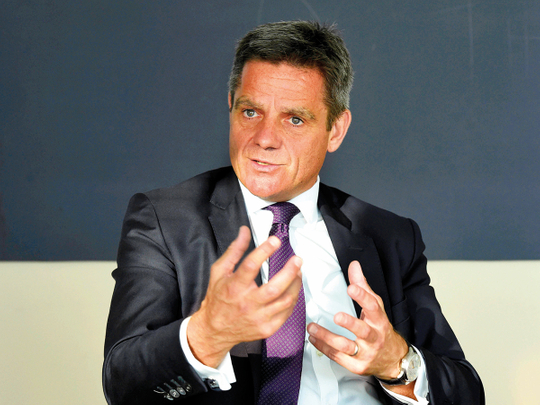
Dubai: The UK has a continued £7 billion (Dh33.45 billion) appetite for export finance to the UAE, the new trade commissioner has said, with a focus on traditionally strong sectors such as energy and defence.
Articulating the UK’s new trade strategy for the Gulf, the official said that a much greater emphasis would be placed on government-to-government relations, as opposed to assisting individual British companies in exporting goods to the region.
Building on a commercial relationship worth £45 billion last year, the UK’s recently-appointed Middle East trade commissioner Simon Penney said that London’s growing tech sector would be coupled with traditionally strong industries such as aerospace and oil and gas to complete the government’s overhauled approach to doing business with the Gulf countries.
“Our focus has been on shorter-term export opportunities than long-term government relationships,” Penney said in a recent interview with Gulf News.
“Where we haven’t been as strong as we could be is at the government-to-government level, around the various transformation and vision agendas.”
Penney described the UK’s desire to play an integral role in the likes of Saudi Arabia’s Vision 2030, and the UAE’s Vision 2021. Several years ago, a number of Gulf countries embarked on multibillion dollar journeys to reduce their reliance on oil and modernise their economies.
“Take Saudi for example … They’ve laid out very clearly the sectors that they want to transform away from the hydrocarbon agenda. We haven’t supported UK industry at a government level to execute those transformation strategies,” he said.
“We’ve tended to be more involved in exporting goods.”
An ex-banker, Penney said he had been hired by the government to provide a deal and solution approach to problems, as opposed to a product approach.
A key tenet of the trade ministry’s plan for the region, Penney said, was to focus on fewer, more productive sectors.
He noted that aerospace and the likes of Rolls-Royce and Airbus had historically done well in the region, as had a number of the UK oil majors.
Defence and security, too, were named as key industries going forward by Penney.
“What we haven’t been is focused. It’s all about focusing on fewer things and being much, much better at fewer things,” he said.
“You’ll be better than if you spread thinly yourself across 40 or 45 sectors, and never really being on top of any one sector.”
In addition to pushing for greater British supply chain business tagged on to the larger deals signed by major UK companies, Penney said that many agreements would have a UK credit export wraparound.
So far, the government has financed a handful of Emaar and Meraas projects, Penney said, in addition to a number of commercial aircraft deals.
Financing deals often allowed the UK government to stipulate that a part of the contract value is spent on UK exports.
“Providing that package around solution plus funding, which is a very, very powerful combination.”












